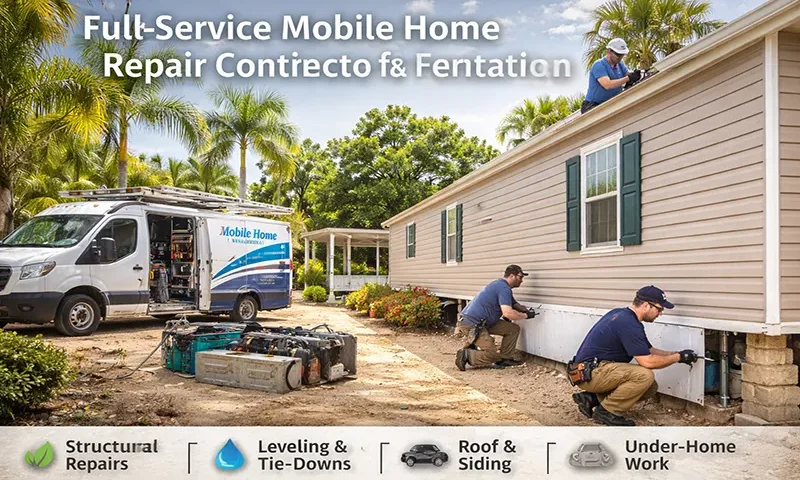Full-Service Mobile Home Repair Contractors in Central Florida
Mobile homes in Central Florida require professional maintenance to remain safe, level, and storm-ready. From foundation leveling to tie-downs and skirting, a complete solution is essential. Florida Truly Level Mobile Home Service offers full-service mobile home repair contractors in Central Florida, providing comprehensive solutions for manufactured home owners.
📞 Call Today: 1 (689) 340-5795
📍 1757 S Village Dr, Deltona, FL 32725
Comprehensive Mobile Home Repair Services
Our team specializes in a wide range of mobile home services, ensuring your home is protected from structural, environmental, and storm-related risks. Services include:
- Central Florida manufactured home leveling specialists – leveling and foundation repair
- Mobile home releveling and foundation repair in Central FL – correcting uneven floors and structural shifts
- HUD-compliant tie-down and retrofit services across Central Florida – securing your home for storms and compliance
- Storm-ready hurricane anchoring for Florida manufactured homes – protecting your home from hurricane-force winds
We … READ MORE ...
Urban Luxury and Smart Wellness: Narra Residences for Modern Living
Introduction: Elevating Urban Family Lifestyles
Singapore’s real estate market increasingly demands properties that offer luxury, smart technology, and wellness integration. Narra Residences meets these expectations with condos that combine family-friendly design, smart home features, wellness amenities, and high investment potential. The development is crafted for homeowners who value comfort and efficiency, as well as investors seeking future-proof properties that deliver both lifestyle and financial returns.
Prime Location: Connectivity Meets Convenience
Narra Residences enjoys a strategic location close to MRT stations, reputable schools, shopping malls, and business districts. Families benefit from nearby parks, playgrounds, and recreational areas, ensuring a balanced urban lifestyle. Professionals appreciate short commutes to workplaces, while investors gain from the high rental demand and potential for long-term capital appreciation. Its prime location offers the perfect balance of accessibility, convenience, and lifestyle quality.
Smart Home Technology: Modern Living Simplified
Each unit features advanced smart home systems, … READ MORE ...
The Complete Lifestyle: Living Experience at Pinery Residences
At Pinery Residences, life is about more than just owning a home — it’s about embracing a lifestyle of luxury, comfort, and community.
Every aspect of the development, from design and amenities to location and services, has been thoughtfully planned to provide residents with an unparalleled living experience. Whether you prioritize wellness, recreation, convenience, or investment potential, Pinery Residences offers a holistic environment that meets diverse needs.
This is where luxury, lifestyle, and community converge.
Modern and Thoughtful Design
Each residence is crafted with attention to detail, balancing aesthetics and functionality.
Spacious layouts, contemporary architecture, and premium finishes create a comfortable and stylish environment. Thoughtful design ensures natural light, ventilation, and seamless integration of indoor and outdoor spaces, enhancing daily living.
Comprehensive Amenities for All Ages
The community provides amenities that cater to families, professionals, and seniors alike.
From fully equipped gyms and swimming pools to playgrounds, meditation areas, … READ MORE ...
One Sophia Singapore: Wellness, Spa, and Holistic Lifestyle Integration
A Sanctuary for Mind, Body, and Soul
One Sophia Singapore, located along Sophia Road in District 9, offers more than luxurious residences—it delivers a holistic lifestyle that integrates wellness, spa-inspired facilities, and mindful living. Designed for modern urban dwellers who prioritize health and wellbeing, One Sophia creates an environment where relaxation, fitness, and rejuvenation are seamlessly woven into everyday life.
Spa-Inspired Facilities at Your Doorstep
Residents of One Sophia enjoy on-site spa-inspired amenities designed to provide relaxation and comfort without the need to leave the development. From serene lounges and meditation areas to dedicated spa rooms, every space encourages tranquility and restorative experiences. These facilities allow residents to unwind after a busy day while maintaining a lifestyle of sophistication and ease.
Fitness and Wellness Integration
The development offers state-of-the-art fitness centers, yoga studios, and swimming pools that cater to various wellness routines. Residents can engage in cardiovascular workouts, strength training, … READ MORE ...
The Continuum Security and Privacy Review: Peace of Mind in District 15
Why Security and Privacy Matter
When choosing a condo, security and privacy are non-negotiable.
Residents need peace of mind for their families, belongings, and personal space.
The Continuum, located in Singapore’s District 15, offers state-of-the-art security systems, thoughtful layouts, and privacy-oriented designs, making it a safe and comfortable home for all.
Developer’s Approach to Security
Hoi Hup and Sunway prioritize safety without compromising lifestyle:
- Integrated Security Measures: CCTV, access control, and on-site personnel ensure constant monitoring.
- Design for Privacy: Layouts and unit positioning reduce exposure and enhance seclusion.
- Family-Friendly Safety: Pools, gyms, and outdoor areas are secure and child-friendly.
- Future-Proof Systems: Modern technology supports long-term security reliability.
Security is woven into the development, not just an add-on feature.
24/7 Security Personnel
The Continuum features professional security teams around the clock:
- Patrols: Regular surveillance of common areas and entrances.
- Response Readiness: Quick response to















